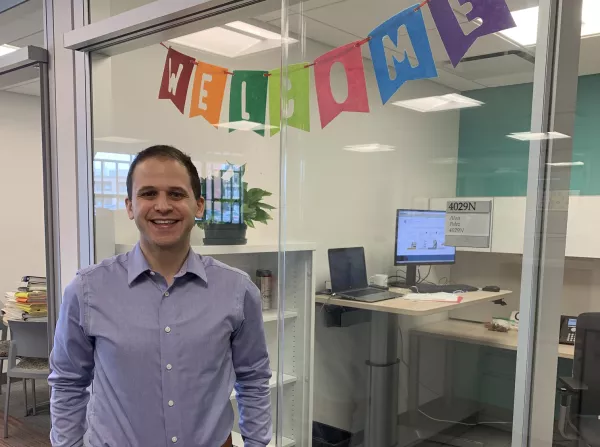Investigator Spotlight: Getting to know Alon Peltz

Alon Peltz, beyond the CV
Welcome to our new spotlight series, where we look beyond the CV and learn more about our investigators. First up is new faculty member Alon Peltz, MD, MBA, MHS, a pediatrician and health services researcher who investigates the impact of health insurance design on cost, quality, and affordability. He joined the Department of Population Medicine as a new faculty member in 2019. His research is informed by his clinical experiences caring for children with special needs and his policy experiences working in state and federal health agencies. Let's dive in!

Q: What kind of research are you doing and why do you think it’s important?
My research largely focuses on how social condition impacts health. We are currently working on a series of studies examining the effects of food insecurity and government nutritional supports on health outcomes. Unfortunately, many children, adults, and older adults in our country have limited access to affordable healthy food on a daily basis. There have been some recent federal policy changes in this area, and we hope our work helps inform the ongoing national debate.
Q: What sparked your interest in studying the impact of health insurance policies?
In 2014, I had the opportunity to work at the Centers for Medicare and Medicaid Services, the federal agency responsible for overseeing Medicare and Medicaid. Getting to work in a large government insurer, which at the time was undergoing a lot of change due to the Affordable Care Act, was a really transformative experience. This afforded me the opportunity to see how the design of health insurance and care delivery can translate into improvements in health outcomes. Since then most of my work has focused on the impacts of health care delivery and insurance policies on cost, quality, and access to care. I’m excited to join the faculty here at DPM doing a lot of great work in this area.
Q: You also spend a portion of your time as a physician at Boston Children’s Hospital. How does your work as a pediatrician impact your research?
The partnership between the Institute and Boston Children's Hospital is great. Getting to provide care to children and families is rewarding, and offers a valuable research perspective on the challenges that many families face navigating health insurance and the health care system at large. As pediatricians, we are often advocating for the needs of the children we care for, and so much of my research is grounded in advocacy, aiming to generate data that will inform better health policies for children.
Q: Navigating health insurance plans can be complicated for the average consumer. What have you learned about health insurance design that would be useful for someone figuring out their plan?
I wish I could say my research has given me wise insights into choosing my own health insurance plan, however, my family would probably disagree with me there. Seriously, making health care decisions is challenging for all of us, and it becomes particularly more difficult when we have little information about how much health care we are going to need, and how much it will cost. For families with little experience with the health insurance system or limited literacy, it can be nearly impossible. My advice is to remember that there are many resources available, such as enrollment agents, brokers, and decision support software, to help us make better and more informed choices.
Q: You previously served as the Associate Medical Director for Massachusetts Medicaid. How does that experience shape the direction of your research?
Medicaid plays such a critical role in caring for socially vulnerable populations. In recent years a lot of states have started to better integrate social and medical care through their Medicaid programs. This presents a lot of opportunities for innovation but also challenges in making sure these new programs work for everyone. I think rigorous evaluation of these delivery system changes will be important to understand which ones are working well and which ones are not working so well.
Q: What do you like to do in your free time?
I really enjoy cooking, particularly Mediterranean and Middle Eastern cuisine, and so on weekends our kitchen is usually transformed into some sort of (often messy) cooking laboratory. I try to find a few hours each weekend to read a good book. I’m on a Kurt Vonnegut streak at the moment. And definitely going for long walks. One of our favorite weekend activities is to pick a neighborhood of Boston that is unfamiliar to us and spend a day exploring the sights and sounds of the neighborhood on foot.